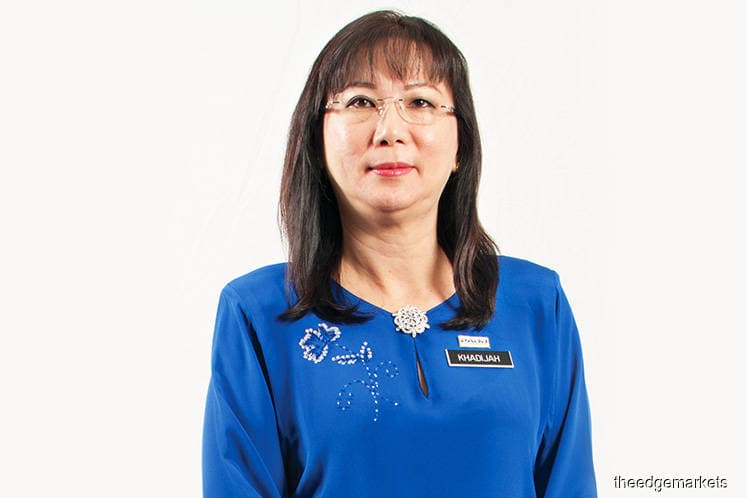
This article first appeared in The Edge Financial Daily on February 26, 2018
KUALA LUMPUR: Public sector reform is not without its challenges. This comes as government units face pressure to implement change speedily. While various methods have been applied, Malaysia has used the delivery unit approach to tackle its most pressing matters such as improving learning outcomes.
However, the aspiration to develop world-class education doesn’t happen overnight, says Education Performance and Delivery Unit (Padu) chief executive officer Khadijah Abdullah.
Padu was set up in 2013 by the ministry of education to facilitate, support and deliver initiatives set out in the Malaysia Education Blueprint 2013-2025. The unit comprises the best of talents from both the civil and private sectors.
Various initiatives have been planned over three waves, which will see the transition of the education system to adopt 21st century learning. It also aims to bring Malaysia’s education to the top one-third of countries participating in the Programme for International Student Assessment by 2025.
Cognisant of the fact that most transformation programmes fail, Padu’s journey, however, has been on a gradual upward momentum, Khadijah said.
“Our role is to help the ministry achieve all that it’s planned. So far things are moving well, people are very positive. In the first wave we achieved 87% of what we planned for. That was audited by an external party. So we have about 13% that we have to spill over for the second wave, but we can manage,” she told The Edge Financial Daily in an interview.
She does, however, acknowledge the challenges faced — the most prevalent one being time.
What’s the greatest challenge? “Speed,” said Khadijah. “We want things to move faster. Things are not moving as fast as we would like [them] to, but they are moving.”
Efficiency of manpower and costs of running projects are some factors for this. Change too is an important factor that affects the delivery unit’s mission, she added.
“Sometimes it’s about changing the way of doing things so that [it] takes a bit of persuasion. People do things differently. Sometimes you have barriers or bottlenecks and so, you need some time to ‘de-bottleneck’ them,” said Khadijah.
The World Bank has acknowledged the challenges faced and impact created through the delivery unit. It recently published its latest report titled “Improving Education Sector Performance: Lessons from the Delivery Unit Approach” as part of its latest instalment to the organisation’s Outbound Knowledge Report Series.
In the report, the World Bank highlighted the role of the delivery unit in improving education outcomes, which is a key government priority.
“Many developing countries adopt sensible strategies to improve education outcomes, but few are able to successfully implement them. Implementation challenges take on many forms, including lack of prioritisation or appropriate diagnostics of the underlying challenge, poor coordination, or insufficient monitoring and evaluation that allow for course correction,” the bank said.
In particular, the report examined how Padu facilitated programme implementation and delivery of results through the Literacy and Numeracy Screening (Linus) programme — a key initiative in the blueprint aimed at improving literacy and numeracy of primary school kids in their first three years.
“Unlike other interventions, the Linus task force — comprising several divisions — worked closely with agencies across government to provide an effective framework for coordination, tracking, monitoring and reporting,” said the World Bank, adding that the approach could be useful for other developing countries.
According to Padu’s 2016 Annual Report, 98.6% of Year 3 students achieved the Bahasa Malaysia literacy target, 99% in the English language literacy and 94.7% in Numeracy.
Apart from Linus, another initiative in the blueprint showing good progress is science, technology, engineering, and mathematics (STEM), said Padu executive director Dr Azwan Abdul Aziz.
“STEM has had a stuttering start, things were not easily understood by the stakeholders. But I’m pleased to say that since the middle of last year, we have already set the direction clearly; we know what to do and support from external parties has been good.
“We even have other governmental bodies who now say they want to come together and collaborate. It helps that STEM was made a national agenda. We are glad that since the ministry has prioritised this, others have wanted to do so too. It is very encouraging,” he added.
While the initiatives are work in progress, alternative institution options such as international schools have gained traction. Khadijah is, however, not too concerned about this development, citing local students winning international awards abroad as one good sign.
“Therefore, the whole education system can’t be that bad, right? Perhaps we have pockets where we need to improve, but that’s what the blueprint is all about. We are trying to improve the whole ecosystem, but it will take time.
“We have over 10,000 schools of such diverse background which comes with its challenges. As a delivery unit we can’t compromise but tread carefully. All of these processes take time, you can’t just get it done within three to five years,” she said.
She noted that mere comparison with countries such as Singapore and Finland would not be fair as each country differs in its demographics.
“Our education system is not the same as other countries such as Finland and Singapore. In their case, they only have one education system; they don’t really have remote areas, whereas about 40% of our schools are in remote areas. It’s a different situation,” added Khadijah.